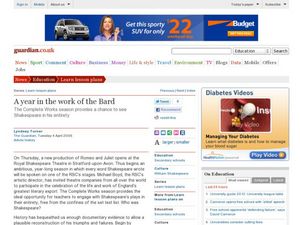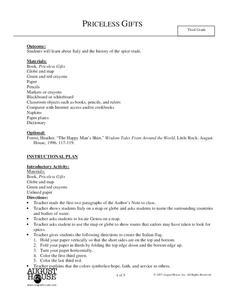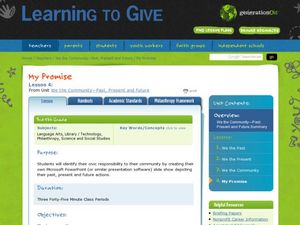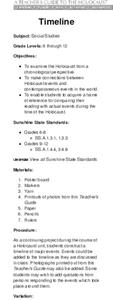Curated OER
Hammurabi's Code
Students explore philosophy by analyzing a historic quote. In this fairness activity, students read a quote by Hammurabi which discusses whether law is for punishing the bad or rewarding the good. Students examine the Ten Commandments...
Curated OER
A Year in the Work of the Bard
Young scholars study the life and times of Shakespeare. In this William Shakespeare lesson, students research the noted Web sites to discover details about Shakespeare's life and the times he lived in. Young scholars also virtually visit...
Curated OER
Who's Who In America? Multicultural Achievers A to Z Past & Present
Students are introduced to important people who have made contributions to society from different cultural groups. As a class, they develop a definition for diversity and work together to make a comparison chart to discover how people...
Curated OER
Horsepower: Harnessed for War
Students explore the technology of war. In this war technology lesson, students research the fighting styles of the Vikings, the Normans, and Medieval Knights.
Curated OER
Forging Freedom
Students read the story Forging Freedom by Hudson Talbott about the holocaust. In this holocaust lesson plan, students also answer discussion questions.
Curated OER
More Than One Grain of Rice
Sixth graders explore cultural habits by viewing food videos in class. In this agriculture lesson, 6th graders identify the importance of rice in the human diet and how different cultures prepare the food. Students view rice harvesting...
Curated OER
The Odyssey: A Deeper Appreciation
Students read "The Odyssey" and identify the ways it relates to their own lives. As a class, they also examine the history of the story and identify the various Greek gods and goddesses. In groups, they focus on the geography of the...
Curated OER
The Name of the Game
Learners explore the cultural significance of various sports from around the world. They then teach their classmates about these sports by participating in a Global SportsFest as both instructors and players.
Curated OER
Adventures in Africa
Students research Africa and prepare an advertisement about travelling to the continent. In this African travel lesson, students research a country in Africa and write an advertisement that encourages travel to the country. Students...
Curated OER
Priceless Gifts
Third graders read about Italy and the complete activities that investigate the spice trade. In this spice trade lesson plan, 3rd graders analyze characters, write a thank you note, speak Italian, and complete language activities.
Curated OER
King's Headdress: Yoruba, Nigeria
Pupils make headdresses fit for kings. In this Yoruba tribe lesson, students study the tradition of the Nigerian tribe and then create headdress in the style of those used by the Yoruba.
Curated OER
The Powhatan Indians' English Boy
Sixth graders write a historical fiction narrative. In this interdisciplinary instructional activity, 6th graders read the historical fiction Henry Spelman: The Powhatan Indians' English Boy. Students write a piece from the point of view...
Curated OER
My Promise
Students define their own civic responsibility and create a PowerPoint presentation about their volunteer efforts. In this civic responsibility instructional activity, students define the word volunteer and read an article about a...
Curated OER
Egypt's Golden Empire Lesson 5
Students research and discuss the pyramids, temples and obelisk of Ancient Egypt. They work cooperatively to build a model pyramid.
Curated OER
Cultural and Social Transformation since 1865
Students research the evolution of cultural and social issues in areas of Westward Expansion, Immigration, and Civil Rights. They practice writing clear details with supporting evidence and examples and evaluate ways of improving drafts...
Curated OER
Gullah Activities
Students study the Gullah culture by watching a video about Gullah, Gullah Island. They discuss the customs and crafts of the people such as basket weaving, food preparation, pottery, and quilt making. While working in centers, they make...
National Endowment for the Humanities
The Debate in the United States over the League of Nations: Five Camps: From Voices of Consent to Voices of Dissent
Students explore and discuss Woodrow Wilson's concepts for peace and the League of Nations. They understand efforts made to foster American support for the League and discuss the opposition shown in the Senate.
Curated OER
Looking Back
Students examine the difference between a communist and a free-market economy. They discuss challenges occurring in Macedonia and explain the mood of its people.
Curated OER
History, Literature, Art: Connections
Eleventh graders read either The Death of the Ball Turret Gunner, The Crucible, or Hiroshima, and examine connection between art and literature by relating particular works of art to their readings, relying on both visual and written...
Curated OER
Studies of the Eastern Worlds: Historical Summaries
Seventh graders interpret their own meaning of the painting, "Christ's Descent into Hell" by Hieronymus Bosch and the song "We Didn't Start the Fire" by Billy Joel. They focus on the chaos created in both the art and music and discuss...
Curated OER
Lesson 5- Robert Rauschenberg: Reinventing Art
Students examine how Robert Rauschenberg influenced popular art and how art is influenced by politics, social and cultural messages. They design a new art movement and create art that is indicative of that movement.
Curated OER
Hachimaki/Shibori Lesson Plan
Sixth graders are introduced to the technique of Arashi Shibori and its history. In groups, they discover how to perform this process and examine how to do hachimaki. To end the lesson, they make their own hachimaki to wear and share it...
Curated OER
Teaching About Trade in the Ancient Mediterranean
Sixth graders examine the trade routes in the Mediterranean of the Ancient world. In groups, they view slides of artifacts while answering questions on a worksheet. After watching a video, they discuss how each object was found and...
Curated OER
Holocaust Lesson Plan: Timeline
Pupils explore the chronology of the Holocaust, make connections between Holocaust events and contemporaneous world events and acquire a frame of reference for comparing their reading with actual events during the time of the Holocaust.























